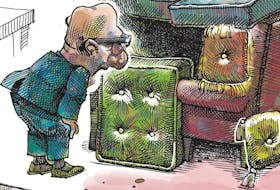No one fights like family.
They know where the old bruises are, the ones that go as deep as bone and hurt like hell the instant you press them. They know where the skeletons are buried; no one can crush you as successfully with a single off-hand comment than an angry sister or a sullen brother.

A parent, no matter how old, needs no more than a familiar raise of the chin and turn of the head to communicate a deep disappointment that instantly dates back to your childhood.
So it’s no wonder that family matters of all kinds sometimes end up in court.
It’s what happens when parents die, a family member’s named executor of the will, and things go off the rails. In Atlantic Canada alone in the last three months, several such cases have emerged.
Anyone who follows the courts at all knows how family law cases — divorces — are among the most take-no-prisoners cases you can find. People who used to be in love can transform that love remarkably quickly into hate, and then use every means at their disposal — including every asset they own and more as well — in an effort to hurt their former partner.
But there’s another messy part of family that comes up more often in the courts than you might expect.
It’s what happens when parents die, a family member’s named executor of the will, and things go off the rails. In Atlantic Canada alone in the last three months, several such cases have emerged.
Two brothers ended up in P.E.I. Supreme Court over the handling of their deceased father’s property holdings.
In Nova Scotia, a brother battled with a sister over whether the sister had taken advantage of their mother when the mother was “incapacitated by illness, incompetent, and subject to undue influence.” In another Nova Scotian case, family members are taking the unusual step of having provincial legislation about wills undergo a challenge under the Charter of Rights — to include adult children who weren’t named in a will. A third case in that province involved two sisters fighting over the division of the only asset left in an estate, a small white bungalow on a quiet Dartmouth street.
In Newfoundland, it was a case of children challenging the survivorship rights of their father’s common-law spouse to the couple’s joint accounts; the children felt the money should go into the estate instead.
And remember: getting to court is the last and most expensive battlefield for families who dispute what a parent’s intentions were for their estate. These are only the cases that got all the way through to the courtroom and the judge and the very expensive prospect of having lawyers fight things out on your behalf.
It shouldn’t have to be that way. We all have the ability to spell out how we want our affairs to be handled, even if, deep down, most of us think we’re going to live pretty much forever. (Not-so-fun fact — we won’t.)
We can clearly list our assets, what we want done with them, and how the process is to work. For scores of Canadians, the death of a parent gets dealt with without a fight in the courts (though often with some lingering scrap of resentment somewhere within the family unit).
Strive to be among that group.
Even clarity is no guarantee; wills are sometimes challenged simply because someone argues they’re not fair. And they’re sometimes overturned for just that reason.
Be clear. Be professional. Be forthright. And maybe, just maybe, if you are the parent involved, act like it. Chances are, you’ve been the grown-up for a considerable amount of time.
Oh, and maybe don’t use your will to cruelly settle scores after you’re gone. It just turns a family mess into a long-running, sometimes expensive tragedy.
Some things are better taken quietly to the grave.
Russell Wangersky’s column appears in 36 SaltWire newspapers and websites in Atlantic Canada. He can be reached at [email protected] — Twitter: @wangersky.
Recent columns by this author









